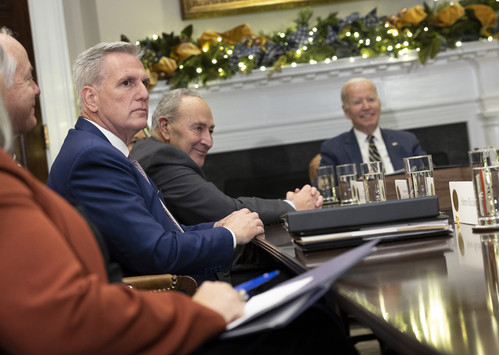Live on the homepage now!
Reader Supported News
Ukraine is doing so well in part thanks to the unified Western response. Unlike reactions to Russia’s invasion of Georgia in 2008 or Ukraine in 2014, the Western pushback against Putin’s latest war has been strong along multiple fronts. NATO enhanced its eastern defenses and invited Sweden and Finland to join the alliance. Europe has provided shelter to hundreds of thousands of Ukrainian refugees. Led by the Biden administration, the West has provided massive amounts of military and economic support at amazing speed, levied punishing sanctions, and begun a difficult shift away from Russian energy. Even Chinese leader Xi Jinping has offered Putin only faint rhetorical support for his war. He has not provided Russia with weapons and has cautiously avoided violating the global sanctions regime.
These are the reasons for optimism. The bad news, however, is that the war continues, and Putin has shown no signs of wanting to end it. Instead, he is planning a major counteroffensive this year. “The Russians are preparing some 200,000 fresh troops,” General Valerii Zaluzhnyi, the commander in chief of Ukraine’s armed forces, warned in December. “I have no doubt they will have another go at Kyiv.” Even though Putin must understand by now that Ukrainians are willing to fight for as long as it takes to liberate their country, he still believes that time is on his side. That is because Putin expects Western governments and societies to lose their will and interest to keep helping Ukraine. If Putin or his aides watch the television personality Tucker Carlson on Fox News or saw the protests last fall in Prague, their hunch about waning Western support would be confirmed.
If Russia starts winning on the battlefield, or even fights to a stalemate, few will remember U.S. President Joe Biden’s remarkable leadership in galvanizing the world to assist Ukraine in 2022. This is why Western leaders need to shift how they approach the conflict. At this stage, incrementally expanding military and economic assistance is likely to only prolong the war indefinitely. Instead, in 2023, the United States, NATO, and the democratic world more broadly should aim to support a breakthrough. This means more advanced weapons, more sanctions against Russia, and more economic aid to Ukraine. None of this should be doled out incrementally. It needs to be provided swiftly, so that Ukraine can win decisively on the battlefield this year. Without greater and immediate support, the war will settle into a stalemate, which is only to Putin’s advantage. In the end, the West will be judged by what happened during the last year of the war, not by what happened in the first.
THE BIG BANG THEORY
The most important step the United States and NATO allies can take this year is to provide Ukraine with weapons that will allow its armed forces to go on the offensive sooner and more successfully in eastern Ukraine. This year started with much encouraging news. The United States, France, and Germany announced plans to provide Ukraine with infantry fighting vehicles, including M2 Bradleys and Strykers, AMX-10 RCs, and Marders, respectively. The United Kingdom decided to provide a dozen Challenger II tanks and 30 AS-90 155mm self-propelled howitzers. The United States and Germany announced plans to give Ukraine one battery each of the Patriot air defense system, and the Netherlands pledged to contribute Patriot missiles and launchers. And finally, the United States made the decision last week to provide Ukraine a few dozen M1 Abrams tanks, which paved the way for Germany and other European countries to send the coveted German-made Leopard 2 tanks.
This is a strong way to start the year, but our support should not stop there. Ukraine needs more of everything that has already been supplied. It especially needs more High Mobility Artillery Rocket Systems (HIMARS) and more Guided Multiple Launch Rocket Systems (GMLR) munitions, which have proved so effective on the battlefield. If more HIMARS are not available, then the United States should send M270 Multiple Launch Rocket Systems. The more loitering munitions that can be supplied to Ukraine, the better. The number of tanks announced so far is substantial but still falls multiples short of what the Ukrainian military needs to push Russian occupiers out of their country, especially because the Abrams tanks will take many months to be built, trained on, and deployed. Ukraine could also use several hundred infantry fighting vehicles, which number far surpasses those pledged by the United States and other NATO allies in January. Ukraine could also use more Patriot batteries, National Advanced Surface-to-Air Missile Systems, and other air defense systems.
In addition to greater quantities of weapons, the United States and its allies should upgrade the quality of weapons being supplied. At the top of this list should be the long-range missile system called ATACMS. It fires missiles that can travel nearly 200 miles and would thus allow Ukrainian forces to attack Russian airfields and ammunition sites in Crimea and elsewhere that are now out of range and offer sanctuary for Russian soldiers using long-range weapons to attack Ukrainian towns. The provision of long-range strike weapons, including the Ground-Launched Small Diameter Bomb, could be a game-changer in a Ukrainian offensive this spring. The Ukrainian military also needs much stronger offensive air capabilities, including Soviet-made MiG-29 fighter jets and advanced drones such as the U.S. Gray Eagle and Reaper models.
Ukrainian pilots also should begin training to fly F-16 fighter jets. Eventually, either in later stages of this war or for enhanced deterrence after the war, Ukraine’s air force will need to switch from Soviet- or Russian-made planes to U.S. fighter aircraft. In return for receiving these weapons, Ukrainian President Volodymyr Zelenskyy could sign a legally binding agreement to not use these weapons to strike targets inside Russia.
The way this new military assistance is announced also matters. Rather than providing ATACMs in March, Reapers in June, and jets in September, NATO should go for a Big Bang. Plans to provide all these systems should be announced on February 24, 2023, the first anniversary of Putin’s invasion. An announcement of this size will produce an important psychological effect inside the Kremlin and Russian society, signaling that the West is committed to Ukraine’s ambition to liberate all occupied territories. Already Kremlin propagandists on television lament that they are fighting a well-armed and rich NATO, which has greater resources than Russia. On February 24, Biden and NATO allies could fuel this perception that it would be futile for Russia to continue its fight.
RISK CALCULUS
Soon after the war began, many observers, including me, worried that Putin would view the provision of these kinds of offensive weapons as escalatory. And yet, after deployment of these major weapons systems, Putin so far still has not escalated. The reason is simple: Putin has no good way of doing so. He is already using very expensive cruise missiles to attack apartment buildings. He cannot attack NATO, lest he risk a broader war that Russia would lose quickly. That leaves him with only the nuclear option, but even that would not serve him well. Everyone agrees that a nuclear attack against the United States or other NATO countries is off the table because mutual assured destruction is still in place. The probabilities of Putin using a tactical nuclear weapon inside Ukraine is also very unlikely as it would serve no obvious battlefield objective. It would not stop Ukrainians from fighting. Just the opposite: they would recommit to defeating Russia, and even unleash more attacks, including covert operations against targets inside Russia. Using a nuclear weapon in Ukraine also would rally greater opposition to the war around the world, including in Beijing, within Russian society, and maybe even among Russia’s generals. Obviously, Ukrainians would suffer most from such an attack, and yet they are the ones urging the West not to be deterred by Putin’s nuclear blackmail.
There are risks to providing more and better weapons to Ukraine, but there are also risks to not doing so. If the war in Ukraine drags on for years, so many more people—Ukrainians first and foremost, but also Russians—will die. “Stalemate” on the battlefield is a euphemism for continued death and destruction. This is the cost of incrementalism.
Protracted war also risks losing public support in the United States and Europe. At the end of 2022, Biden signed into law a new $45 billion aid package for Ukraine. This should fund U.S. military assistance until the end of this year, including new weapons systems such as ATACMs and fighter jets, should they be given the green light. But now that the House of Representatives is under Republican control, future appropriations could be less forthcoming. If the war drags through the end of the year without major Ukrainian victories, the Biden administration will struggle to obtain congressional renewal for a new military and economic assistance package, especially as the presidential election heats up with at least one major candidate, Donald Trump, who is not a fan of aid to Ukraine. Debate over aid will become fiercer in European capitals, too, if 2023 results in only minor changes on the battlefield. The dangers of incrementalism grow over time.
TIGHTENING THE VISE
Governments supporting Ukraine also need to dramatically ratchet up sanctions. The United States should lead the way by designating the Russian Federation a state sponsor of terrorism. Doing so would first amplify American condemnation of Russian terrorist acts in Ukraine and other countries. But there are also practical effects: U.S. citizens and companies would no longer be able to engage in financial transactions with the Russian government. Higher scrutiny would be given to transactions with Russian state-owned banks, state-owned enterprises, and government-related individuals. Controls over exports, re-export, and transfer of dual-use items would be strengthened.
But a terrorist designation would not close all loopholes. The United States, together with other countries in the sanctions coalition, should enact full-blocking sanctions on all major Russian banks, such as Gazprombank, as well as all state-owned enterprises—all of them—including Rosatom, Russia’s state-owned nuclear energy company. Of course, exemptions for the financing of Russian exports of food and fertilizer should remain, but the West must make it more difficult, and therefore more expensive, for Russian companies to transact with the outside world.
New sanctions must be imposed to cut off all critical technologies helping Putin’s war machine, from microprocessors needed to build smart weapons to all forms of imported information technology on which the Russian government and economy relies. The G-7 should reduce the price cap on Russian oil exports further, from today’s $60 limit to $30 a barrel, and introduce greater penalties for shipping companies, insurance agencies, and banks that violate the price cap. And they must apply more pressure on U.S. and European companies still doing business in or with Russia. These companies cannot continue to pay taxes to a terrorist state. They must leave.
Individual sanctions must be expanded dramatically to include all Russian oligarchs still not sanctioned but supporting Putin, all government officials, all top managers and board members of the state-owned enterprises, all propagandists advocating for the war, all Russian soldiers fighting in Ukraine, and the family members of everyone in these categories. Sanctioning categories of people—United Russia party members, government officials, soldiers, and so on—and not specific individuals has the added advantage of giving Russians the option of resigning as a way to get off the sanctions list. At a minimum, countries involved in the sanctions regime could start expanding their lists to include everyone already identified by Ukraine’s National Agency on Corruption Prevention as deserving of sanctions. Countries imposing sanctions also must coordinate their activities so that if a Russian is sanctioned in one country, that person immediately appears on the sanction list of all countries participating in the sanctions regime.
New travel restrictions should also be imposed on all Russian citizens. A complete travel ban to all democratic countries is one option, although it risks alienating Russians opposed to the war. Another is to make all Russians wanting to travel to democratic countries pay an additional “Ukrainian reconstruction fee” on top of the cost of their visas. If they do not want to pay such a fee for fear that it signals support for Ukraine, then they can vacation in Minsk instead of Barcelona. The way these new sanctions are announced also matters. It is best done all at once by participating countries on February 24.
At the same time, democracies should make it easier for Russians opposed to the war to defect. The tens of thousands of Russia’s best and brightest who have already fled should be given work visas to stay in Europe and the United States. Men who fled Russia to avoid the draft should be given incentives to not return until the war is over. Russian opposition leaders and independent journalists living in exile should be able to obtain visas and work permits, open bank accounts, use credit cards, and monetize their YouTube channels with much greater ease than can be done today.
MONEY AND MESSAGES
Ukraine needs more money, and the West needs to find new ways to provide it. The obvious place to start is to transfer the over $300 billion in Russian central bank reserves currently held by the West to the government of Ukraine. Treasury and finance officials in the United States and Europe are nervous about such moves. But state assets have been seized legally in the past, in places such as Iraq and Afghanistan, and it should be done now. (Moreover, doing so now has the added advantage of sending a deterrent message to China about invading Taiwan, as Beijing has many more financial reserves invested in the West.) In addition, following the lead of the Canadian government, frozen assets of Russian oligarchs should also be considered for confiscation and transfer to Ukraine. Western countries should impose an import tax on all Russian goods and an export tax on all goods and services provided to Russia, the proceeds of which would be transferred to a Ukrainian reconstruction fund. And comprehensive planning for the hundreds of billion dollars postwar reconstruction of Ukraine should begin today—an effort that should include an international pledging conference.
Harsher sanctions work to cut off Russia from the world, but the West should simultaneously do more to reach the hearts and minds within Russia. The U.S.-government-funded Radio Free Europe/Radio Liberty nearly tripled its audience, most of it in Russia and Ukraine, after the war began. Russian independent media now operating outside of Russia also expanded their audiences. Viewership of YouTube channels operated by colleagues of jailed opposition leader Alexei Navalny also jumped dramatically in 2022. The two channels Navalny originally created have at least 9.5 million subscribers. But every one of these outlets would benefit from more resources, new methods of financing, easier access to work visas, and technologies to help them penetrate Putin’s informational Iron Curtain. New modalities for reaching Russians—be it through text messaging, greater use of TikTok, and Telegram channels, or more subtle cultural messaging rather than direct news—should be attempted.
As long as Russian soldiers occupy their country, Ukrainians will fight. They will fight with or without new advanced weapons, with or without harsher sanctions, with or without money to help them run their country. Understanding this key insight about the Ukrainian mentality today leads to an obvious policy recommendation for the West: help Ukraine win as fast as possible.
The best way to commemorate February 24, the anniversary of Putin’s invasion, is to make clear that this is the West’s strategy. This requires a rollout—coordinated by dozens of countries on the same day—of more and better weapons, tougher sanctions, new economic assistance, greater public diplomacy efforts, and a credible commitment to postwar reconstruction. This is also the best way to avoid being in the same place when February 24, 2024, rolls around.
Follow us on facebook and twitter!
PO Box 2043 / Citrus Heights, CA 95611










